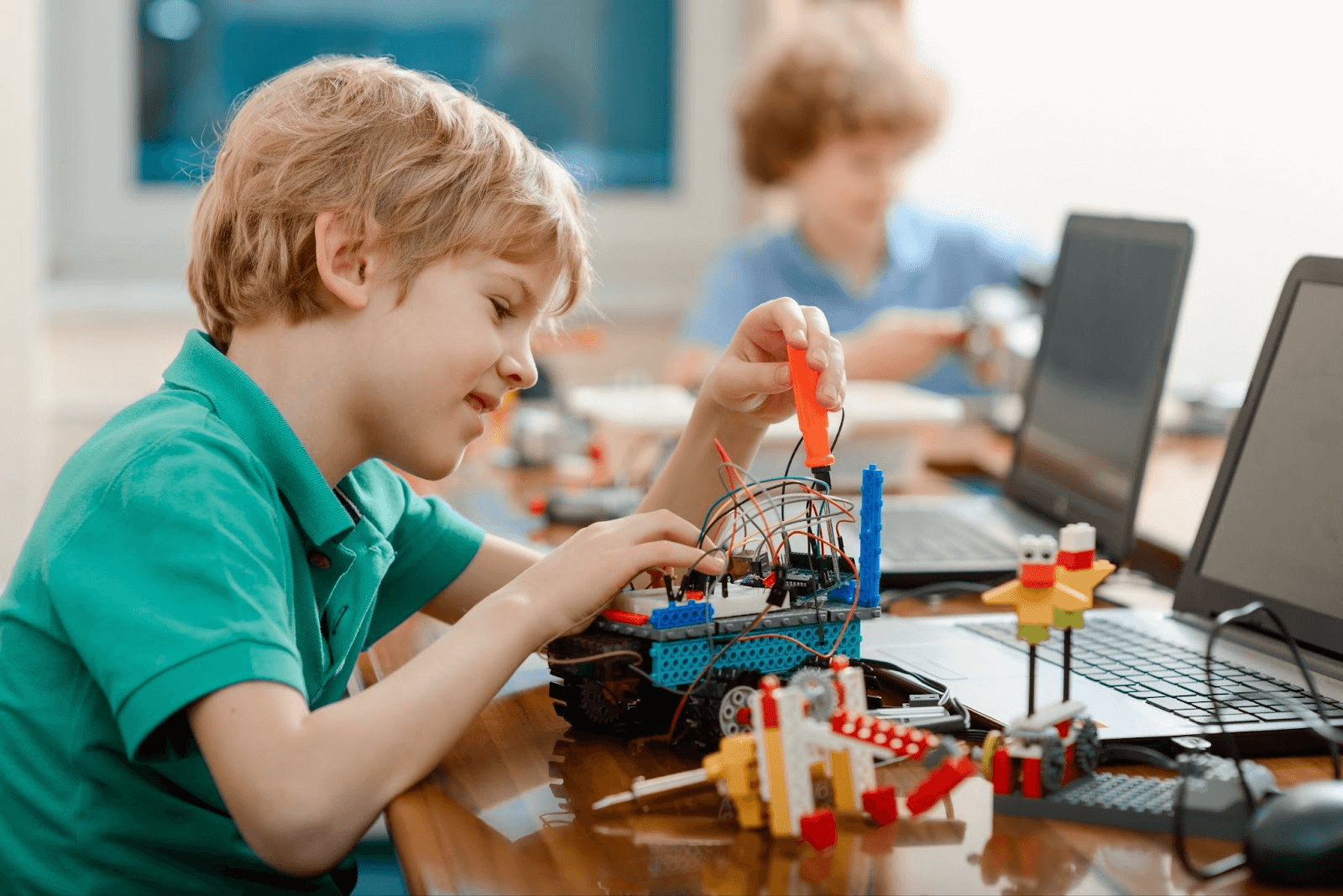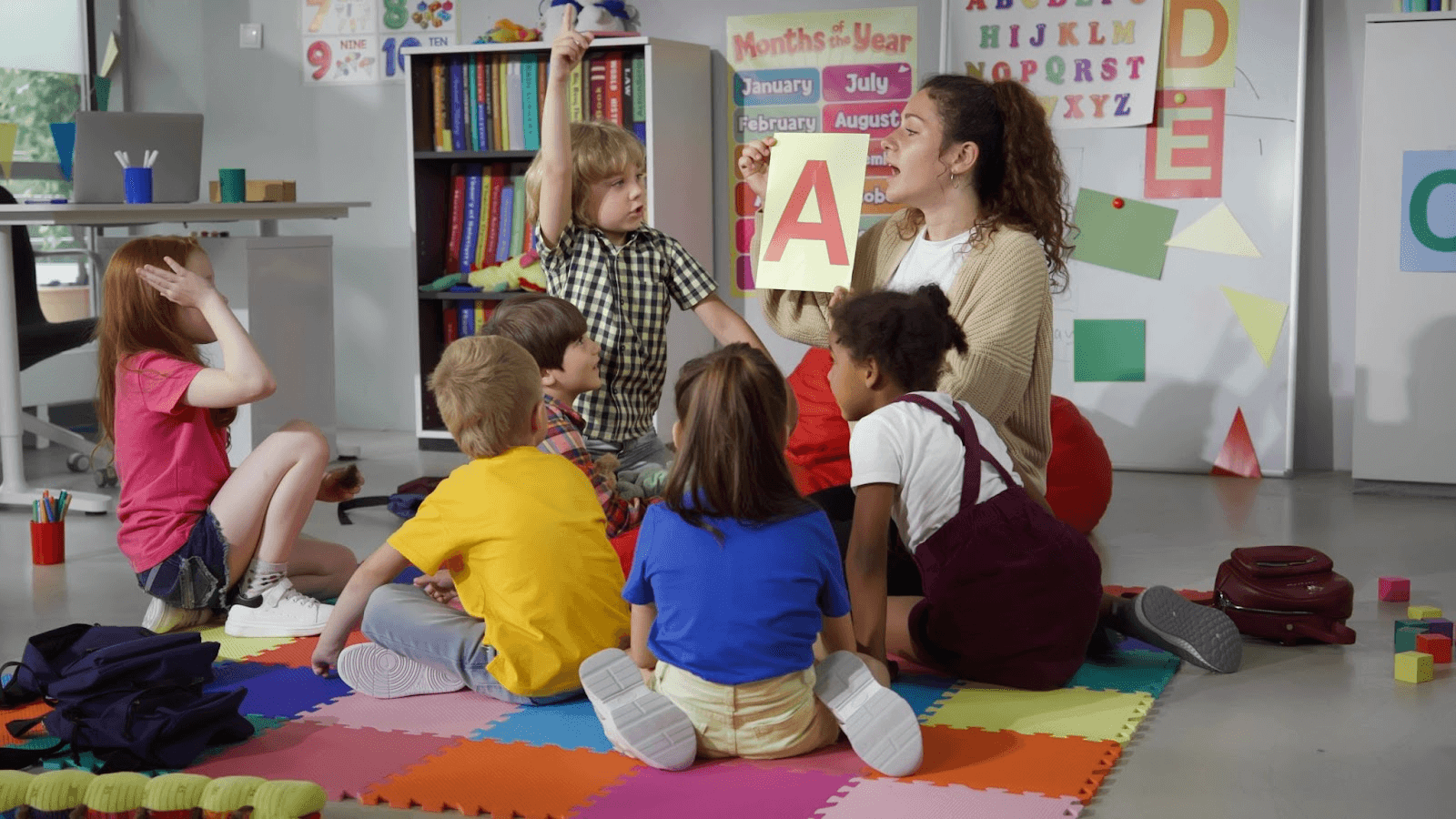In the realm of early childhood education, a revolutionary approach has been gaining momentum — Play-Based Learning. This dynamic method transforms the traditional educational landscape by incorporating engaging activities that captivate young minds.
As we delve into the world of play-based learning, we’ll explore its theoretical foundations, cognitive benefits, and its role in shaping well-rounded individuals. Join us on this journey to unravel the secrets behind this innovative approach.
What is play-based learning?

At its core, play-based learning is an educational philosophy that champions the idea of learning through play. It capitalizes on children’s innate curiosity, encouraging them to explore, experiment, and discover in a joyful and interactive environment. This method recognizes that children, especially in their preschool years, learn best when they are actively engaged in play-based learning activities that stimulate their imagination and creativity.
Theoretical Foundations of Play-Based Learning
Rooted in renowned educational theories such as Piaget’s constructivism and Vygotsky’s sociocultural theory, play-based learning aligns with the idea that children actively construct their understanding of the world. By immersing themselves in play, children not only absorb knowledge, but also develop critical cognitive, social, and emotional skills.
What sets play-based learning apart from traditional approaches?
Play-based learning stands out from traditional approaches by placing the child at the center of the educational experience. Unlike rigid structures, play-based curricula allow flexibility and adaptability, tailoring activities to individual needs and interests. The emphasis is on holistic development, ensuring that cognitive, social, and emotional facets are nurtured concurrently.
The Cognitive Benefits of Play-Based Learning

Cognitive growth plays a central role in the intricate tapestry of early childhood development. Play-based learning, with its unique ability to engage young minds, offers a multitude of cognitive benefits that extend far beyond the surface of playful activities.
Let’s delve into the cognitive dimensions of play-based education and unravel how it intricately weaves problem-solving skills, language development, and mathematical concepts into the fabric of a child’s burgeoning intellect.
Enhanced Problem-Solving Skills
At the heart of play-based learning lies a rich landscape of challenges that become fertile ground for the cultivation of problem-solving skills. As children engage in various play scenarios, whether building block structures, navigating imaginative worlds, or collaborating in group activities, they are presented with problems to solve. These challenges encourage critical thinking, creativity, and the ability to adapt strategies – essential skills that form the bedrock of problem-solving.
Moreover, the freedom to explore and experiment within the context of play provides children with a safe space to make mistakes, learn from them, and refine their problem-solving approaches. This iterative process hones their analytical thinking and instills resilience and a growth mindset.
Language Development
The interactive nature of play serves as an organic catalyst for language development. When children engage in imaginative play, they naturally employ verbal communication to express ideas, negotiate roles, and collaborate with peers. This process not only enhances their vocabulary but also refines their articulation and expression.
In play-based scenarios, children become storytellers, assigning roles, creating narratives, and participating in dialogues. This multifaceted linguistic engagement fosters a deep understanding of language structure, semantics, and syntax. As they immerse themselves in these linguistic experiences, children lay the foundation for effective communication – a skill essential for academic and social success.
Mathematical Concepts
Play seamlessly integrates mathematical concepts into the fabric of a child’s playtime. Whether it’s sorting objects, counting items, or understanding spatial relationships, these fundamental mathematical principles become inherent components of play activities.
For instance, in a pretend kitchen setting, children may instinctively engage in activities that involve measuring ingredients or organizing play utensils based on size and shape. Building with blocks introduces spatial awareness and geometry, while counting items during a pretend store activity reinforces basic numeracy skills.
The beauty of these mathematical integrations lies in their natural occurrence within the context of play, making learning both enjoyable and meaningful. As children navigate these mathematical dimensions, they acquire foundational skills and develop a positive attitude towards the subject, setting the stage for future academic success.
Social and Emotional Development through Play
Play provides a natural platform for children to develop crucial social and emotional skills. Engaging in group play fosters teamwork, communication, and empathy. Furthermore, as children navigate through different roles in imaginative play, they build a strong foundation for emotional intelligence.
Teamwork and Collaboration
One of the remarkable facets of play is its ability to transform a solitary activity into a collaborative experience. Engaging in group play, whether constructing elaborate structures with building blocks or participating in imaginative scenarios, children learn the art of teamwork. Negotiating roles, sharing responsibilities, and collectively achieving a common goal instill a sense of camaraderie and cooperation.
Through group play, children develop an understanding of the dynamics of working with others. They learn to listen, compromise, and appreciate the diverse contributions of their peers. These early lessons in teamwork lay a foundation for effective collaboration in future academic and social endeavors.
Communication Skills
In the world of play, communication takes center stage as children articulate ideas, express preferences, and engage in dialogues with peers. Whether they are assigning roles in a make-believe scenario or describing the rules of a game, verbal and non-verbal communication become integral components of the play experience.
These communication skills extend beyond mere expression; they include active listening, interpreting non-verbal cues, and adjusting communication styles based on the context of play. As children refine these skills through play, they develop a strong communicative foundation that becomes a valuable asset in navigating the complexities of interpersonal relationships.
Empathy Cultivation
Imaginative play, with its diverse array of roles and scenarios, serves as a powerful tool for nurturing empathy. As children step into different characters and explore various perspectives, they begin to understand and empathize with the feelings and experiences of others.
Through play, children learn to recognize emotions, respond with sensitivity, and develop a genuine concern for the well-being of their playmates. This empathetic understanding contributes to positive social interactions during play and lays the groundwork for a compassionate and socially aware adulthood.
Building Emotional Intelligence
Beyond individual emotions, play cultivates emotional intelligence by encouraging children to navigate a spectrum of feelings within a safe and supportive environment. Whether experiencing the thrill of victory in a game or managing the disappointment of a lost round, children learn to identify, understand, and regulate their emotions.
Moreover, the social interactions inherent in play provide opportunities for children to recognize and respond to the emotions of others. This reciprocal exchange of emotional cues enhances their ability to form meaningful connections and navigate the complexities of social relationships.
Play-Based Learning and Academic Preparedness

Contrary to misconceptions, play-based learning doesn’t hinder academic readiness; instead, it lays a robust foundation. The skills acquired through play, such as critical thinking and creativity, serve as invaluable assets in later academic pursuits.
Overcoming Misconceptions about Play-Based Education
Addressing concerns about the perceived lack of structure, play-based learning emphasizes intentional planning. Educators design purposeful activities, ensuring that each play session contributes to well-defined learning objectives.
Integrating Play into the Curriculum
Successfully integrating play or “preschool learn through play” into the curriculum requires a strategic approach. Curriculum designers must align play activities with educational goals, creating a seamless blend of fun and learning.
Overcoming Challenges in Implementing Play-Based Education
While play-based learning offers numerous benefits, challenges may arise. Adequate teacher training, support from educational institutions, and effective communication with parents are vital elements in overcoming these obstacles.
The Part of Educators and Parents in Play-Based Learning
In play-based learning, educators and parents emerge as crucial architects shaping the educational landscape for young minds. As collaborative partners, they play a pivotal role in orchestrating an environment where the fusion of fun and learning becomes a transformative experience, unlocking the full potential of children’s development.
The Role of Educators in Facilitating Play-Based Learning
Educators play a pivotal role in orchestrating play-based learning environments. They serve as facilitators, observing and guiding children to ensure that play activities align with educational objectives and promote optimal development.
Parental Perspectives on Play-Based Learning
Parents play a crucial role in supporting play-based education. Understanding the benefits and actively participating in their child’s play experiences at home fosters a harmonious connection between school and family.
Future Directions in Play-Based Early Childhood Education in Houston
Houston, a city known for embracing innovation, is poised to lead the way in the future of play-based education. As technology evolves, incorporating interactive tools into play-based learning could further enhance the educational experience for young learners.
Spearheading educational innovation in Houston is Growing Minds Academy, a beacon of excellence in the realm of play-based learning or play-based daycare. With a visionary approach, this institution seamlessly blends structured curriculum and purposeful play (“play-based curriculum”), providing a nurturing environment where children flourish academically, socially, and emotionally.
Nurturing Futures through Play: A Harmonious Symphony of Learning and Joy
In conclusion, the transformative power of play-based learning cannot be overstated. As educators, parents, and policymakers embrace this innovative approach, a brighter future awaits the young minds of Houston.
Growing Minds Academy stands at the forefront, championing play-based education and nurturing the next generation of creative thinkers and lifelong learners. Contact them today!



